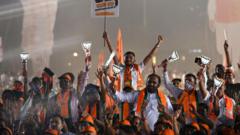A right-wing Hindu group’s request for the demolition of the tomb of 17th-century Mughal emperor Aurangzeb has led to serious unrest in Maharashtra, particularly in Nagpur, where demonstrators clashed this week, resulting in violence and the enforcement of a curfew in the area. The conflict arose from the long-standing animosity towards Aurangzeb, a figure deemed by many Hindu nationalists as a tyrant who oppressed Hindus during his reign.
The clashes began against the backdrop of Chhatrapati Shivaji's birthday, a prominent Hindu king known for his opposition to Aurangzeb. A local faction of the Vishwa Hindu Parishad (V.H.P.) organized protests demanding the tomb be removed, a provocative act considering the historical significance of the site in a region once under Shivaji's kingdom. Although Aurangzeb's tomb lies hundreds of miles away in Chhatrapati Sambhajinagar, recently renamed in honor of Shivaji's legacy, the situation quickly escalated as protesters burned an effigy of the Mughal ruler, intensifying communal tensions.
These developments underscore how right-wing groups in India leverage historical events to stoke discontent among the Hindu population, particularly against the backdrop of contemporary grievances that resonate with the nation’s large Muslim community, which numbers around 200 million. As authorities imposed curfews to restore order, the episode illustrates the fragile peace between different religious communities in India.























